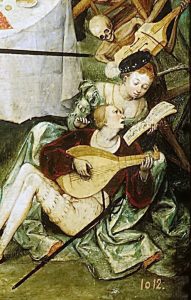This seminar invites individual papers or panels of two or three speakers to explore the concepts of exception and exceptionality in early modern history and literature. It would like to gather researchers specialising in history, literature (theatre, poetry, prose) and visual arts to reflect these concepts in context and in connection and contrast with current understandings of these notions. The seminar also wishes to observe the actual nature of normative rules and models and how much they were followed politically, aesthetically, socially and religiously. It will analyse how the early modern era relied on exception as a method of improvement of normative rules.
The seminar welcomes proposals dealing with exceptionality from a legal, political and theological point of view. In the wake of Diego Pirillo’s forthcoming study of The Refugee-Diplomat: Venice, England and the Reformation (Cornell, 2018), we would like to focus on political, religious, commercial and artistic agents, women and men working both “within and outside formal state channels through underground networks of individuals who were able to move across confessional and linguistic borders, often adapting their own identities to the changing political conditions they encountered”. Papers may focus on exceptional individuals (scientists, writers, painters, politicians, religious refugees, dissenters etc) in exceptional situations and the consequences of such exceptionality on political, social, sexual and religious norms. This exceptionality should be seen in terms of gender and social ranking as well as of confession. Cross-borders literary and non-literary perspectives are also welcome.
Subsequently, papers are invited to discuss the concept of tolerance and the evolution from comprehension to toleration. It also examines early modern criticisms of toleration such as George Wither’s views of toleration as conspiracy in Prince Henry’s Obsequies (1612) and the development of a rhetoric of exclusion in literary and non-literary texts.
As the barriers between literature and history did not exist in the Renaissance, this seminar will naturally explore how art and, in particular, theatre and poetry contributed to these philosophical and political debates. It will examine how early modern male and female artists promoted or opposed exceptions and exceptionality to change aesthetic views and practice. For Keir Elam, theatre “allow[s] the individual’s context to be alienated and an alternative state of affairs to be perceived as more immediately real.” (The Semiotics of Theatre and Drama). Papers may consider then how the visual arts and literature made use of exceptions and exceptionality to question mimesis on a purely aesthetic level but also on the political level. The example of Shakespeare’s reconfiguration of the views on beauty in the wake of the sonnets to the dark lady should lead to a study of the ways the early modern era either encouraged or debunked normative and conservative views of gender, race and sexuality. It will raise the question of the fluctuating views of exemplarity and regularity during the early modern era.
Notwithstanding the importance and the impact of exceptions and exceptionality, the papers may also explore the limits of this concept in terms of our understanding of the early modern era. Peter Brook writes that “all the exceptions blur the truth” (The Empty Space), and we should also reflect on the limits of exceptionality in terms of political as well as aesthetic agency and of our vision and the representation of history. The seminar thus invites reflexive contributions on how contemporary visions on the Renaissance turn the early modern era into an “exceptional” era which some would blindly emulate, and others would dismiss altogether. This debate applies both to the strict content of early modern studies and the place of the Humanities in today’s episteme, but also to the place of early modern studies in the Humanities today.
List of topics for papers / panels (non-exhaustive):
– Tolerance, Toleration and Exceptions: from Comprehension to Exclusion
– Religious and territorial diversity in early modern polities (government, representation, local and geopolitical perspectives)
– Literary discussions of comprehension, toleration and exception (religious, territorial, sexual diversity in theatre, poetry, prose)
– Radical iconoclasm as a major feature of English religious identity (visual arts)
– England and exceptionalism: from toleration to exclusion
-Early Modern Theatre and Rule-Breaking: The Poetics and Politics of Exception on the Stage:
-When the exception is the rule: making exceptions, creating new norms?
-Off-centering normative performance: staging early modern drama anew (anti-traditionalist theories and performances…)
-The theatre exception: an exceptional space for new epistemes
-Norms and exceptions: rethinking norms and normality
– The rule of exemplarity? : the evolution of role models in early modern literature and history
– Discussing early modern views of regularity
-Debunking Normative Beauty: The Exception of the Dark Ladies in Early Modern Literature
-From Petrarchan beauty to Black is Beautiful
-Poetry and stage performance then and now
– “Exceptional and Unacceptable” (Elizabeth Honig, “Lady Dacre and pairing by Hans Eworth”, Renaissance Bodies): The Agency of Early Modern Women on the Political and Cultural Stage
-The cases of Bess of Hardwick, Arbella Stuart et al. as art dealers and political intermediaries
-Early modern women writers and their actual agency: exception, transgression and renewal
-New approaches to teaching and researching Renaissance Studies (History and Literature)
-Shakespeare, the Canon of the Exception: from exception to norm to exception again.
-Early Modern Studies in the contemporary world: the limits of exceptionality
Papers should be no more than 25-30 minutes long.
Please send proposals of individual papers (250 words) or two-to-three-paper panels to Nathalie Rivère de Carles (nrivere@univ-tlse2.fr) and Jean-Louis Claret (jean-louis.claret@univ-amu.fr

